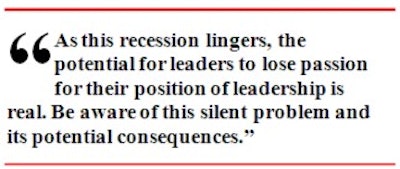
May 1, 2009 — The current U.S. recession has been broader and deeper than most economists had projected. In its early stages, the impact on many industries was minimal. However, as the recession deepened, few companies have escaped its impact. News stories with headlines ranging from "Company Faces Complex Task to Remake Itself" to "Economic Recession Spreads the Pain across the Region" are prevalent. The challenge ahead is indeed daunting and scary.
Amidst these front-page headlines, one story isn't being told — how difficult it is for business leaders in this downturn. As an executive coach, I see the collateral damage from this recession among the leadership ranks. I've seen leaders emotionally drained following a layoff or downsizing. I've listened to stories about sleepless nights and lost weekends. I can appreciate the hopeless thoughts many leaders are experiencing. I identify with them, because I was once there myself.
This leads me to believe that the single most important challenge facing most organizations today is leadership. To lead, executives must possess a multitude of competencies, from financial to organizational development. However, in this recession, the leadership competency we must now embrace is tied to passion. Yes, a lack of passion is a looming silent problem inside many organizations.
If you are a leader, has the passion for your position or business waned in recent months? Are you feeling fatigued or disgruntled with the actions you're expected to make? Are you apprehensive about the future and what it might bring?
If you answered yes to any of these questions, you may be suffering from recessionism, a condition that will rob you of your desire and passion to lead effectively. If you want to escape recessionism's wrath, you must embrace five key areas to survive and thrive. They are:
Movement — In economic downturns, business leaders often become managers, taking responsibility for day-to-day decisions. At some point, however, these executives must resume their roles as leaders. This suggests delegating responsibilities and creating movement at every level of the organization, such as reconnecting with customers and solving problems. Without movement, an organization eventually becomes paralyzed. Create movement by being proactive and motivated.
Focus — Organizations that have been downsized are prone to a loss of focus. Quite simply, there are too many tasks and activities to complete and too few resources, eventually leading to organizational "noise." Leaders must find their personal focus and guide their employees in rediscovering their focus. At times, this means eliminating some activities on your plate. "Leading through chaos" cannot be embraced, nor can it be tolerated. Leaders must be focused on what's important and have others follow in their steps.
Trust — Unfortunately, many leaders have lost trust in themselves and their ability to lead in this recession. It's a tragedy of sorts. However, leaders must reestablish trust in themselves, their suppliers and their customers if they hope to survive this recession. This can be achieved by making sound decisions and creating clarity around what's really important. Trust is the cornerstone of every organization, don't forget it.
Communication — Lines of communication have grown stretched in many organizations, with rumor and hearsay becoming the "inside truth." Leaders must regain control of the communication channel and the messages being told and heard. This is best attained by speaking and communicating from a position of authority and from the tenets of truth. At times this means increasing the frequency of communication. At other times, leaders must state the urgency and importance of the message. Make it happen.
Anxious — There are numerous anxious moments in the life of a leader, especially during times of a recession. It's easy for a leader to become trapped by these anxious moments, inhibiting their ability to lead. Leaders must accept and embrace these anxious moments and be ready to move on. Leaders must not be held back by potential anxious moments that might lie over the horizon.
Recessions have a multitude of unintended consequences. This one is unique in its depth, breadth and length. One challenge facing organizations today is the fatigue setting in among leadership teams, leading to a lack of passion towards the organization and the business. It is a silent problem of immense proportions and one that can surface without warning.
The path out of the woods isn't simple; however, it is achievable. First, corporate boards and business coaches must be aware of the potential problem and its signals. Second, if a problem is identified, act early by creating a plan to provide your leader access to resources such as a business coach or a peer group. Third, boards must be willing to take action if the problem can't be rectified to the needs of the organization and its shareholders.
As this recession lingers, the potential for leaders to lose passion for their position of leadership is real. Be aware of this silent problem and its potential consequences.











![Pros To Know 2026 [color]](https://img.sdcexec.com/mindful/acbm/workspaces/default/uploads/2025/08/prostoknow-2026-color.mduFvhpgMk.png?ar=16%3A9&auto=format%2Ccompress&bg=fff&fill-color=fff&fit=fill&h=135&q=70&w=240)



